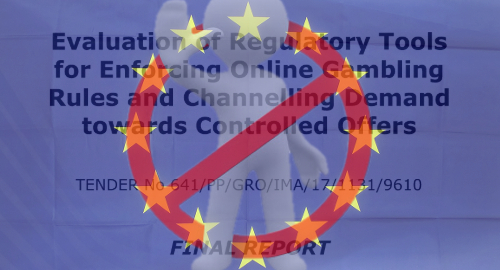 A majority of European Union states employ some form of website domain blocking to combat unauthorized online gambling, but the effectiveness of such tactics leaves a lot to be desired.
A majority of European Union states employ some form of website domain blocking to combat unauthorized online gambling, but the effectiveness of such tactics leaves a lot to be desired.
The European Commission recently released a new Evaluation of Regulatory Tools for Enforcing Online Gambling Rules and Channeling Demand towards Controlled Offers. The 165-page report (read it here) looks to build on the 2011 Green Paper that started a consultation on harmonizing the continent’s approach to the online gambling question.
The report found that 18 EU/European Economic Area (EEA) member states employed website blocking as an enforcement tool, while 12 other states didn’t and four others were considering blocking. Of the states that do block, twelve use DNS blocking, two use IP-address blocking while the rest don’t limit themselves to any one technology.
The report found that a hefty 19% of domains on these blacklists were inactive, with Italy’s blacklist containing the highest percentage (63%) of dormant sites. Italy’s blacklist was also the largest with over 7k domains, well ahead of Greece (2,708) and Poland (2,379).
At the other end of the scale, Slovenia’s more exclusive blacklist contains a mere nine names, largely due to local rules that require a court order before a domain can be blocked.
Domain blocking don’t help regulators block mobile gambling apps, and only three member states (Finland, Germany and the Netherlands) reported having approached app stores to remove offending gambling apps. (The report evidently preceded Norway’s August 2018 purge of Apple gambling apps.)
Notably, only four member states have conducted research on the effectiveness of their blocking efforts. Estonian regulators found that one-third of local gamblers who encountered a ‘landing page’ – which informed them that the gambling site they were attempting to access was off-limits – attempted to circumvent this restriction.
Landing pages that include a list of locally licensed gambling sites were considered effective in helping to ‘channel’ gamblers from the grey/black market to locally licensed sites. However, the report recommends taking care to make this list appropriate to the type of gambler redirected to the landing page, i.e. don’t push online casinos to someone looking for a sportsbook and vice versa.
PAYMENT BLOCKING
A total of 16 EU/EEA member states have measures in place requiring payment processors to block transactions with unauthorized gambling operators, while 13 do not. But of the 16 states that do have such rules on their books, only seven actually use them.
Of those states that do target payments, 53% do so by blocking gambling operators’ accounts, 31% target specified transactions, while the remaining 16% target by merchant category code. One-third of states employ more than one of the above approaches.
Most regulators reported ‘mixed’ success in combatting gambling payment processing, with particularly poor results if operators use accounts located outside the countries in which their gamblers reside. The need to identify specific bank accounts used by unauthorized operators was also seen as a key hindrance in this fight.
Most of these payment-blocking efforts are channeled against traditional card networks and online payment processors such as PayPal or Skrill. Only three states – Estonia, France and Norway – currently target cryptocurrencies in their fight against online gambling payments, although all EU member states will have to include cryptocurrency wallet providers in their anti-money laundering (AML) protocols once the Fifth AML Directive takes effect on January 1, 2020.
ADVERTISING FAIL
Two-thirds of EU/EEA states regulate gambling advertisements at the government level, while 25% require prior review of gambling promos. But advertising is largely conducted online these days, and only five state regulators have some informal arrangement with social media companies to take down ads deemed to have strayed beyond the local bounds of propriety.
Furthermore, while 20 states apply their regulatory standards to online advertising, only 13 states include affiliates, influencers and brand ambassadors in these efforts. Furthermore, only six states have ever taken any enforcement action against these non-traditional marketing channels.
Less than two-thirds of regulators reported having the power to issue notice and takedown requests for illegal online advertising, while only 21% had the tools to ensure these ads stayed offline. Moreover, just over two-thirds of regulators said they’d never issued any takedown notices.
COOPERATION, SANCTIONS LACKING
The report found little cooperation among regulators. Only 16% of regulators reported regularly exchanging info with their counterparts in other member states, while 42% never exchange info.
The report also found that the majority of regulators don’t have a formal framework for evaluating the effectiveness of their regulatory schemes.
In terms of sanctions imposed on operators, nearly two-fifths of states imposed no sanctions at all in 2015-17. More than half (52%) of member states consider such punishments private information but the report claims that this secrecy lessens the deterrent effect of regulatory punishments.
Nine EU/EEA states have rules on their books calling for sanctions against players who gamble with unauthorized sites, yet only three states have actually imposed such sanctions, in part due to difficulties in proving that players understood the site on which they were playing was out of bounds.





